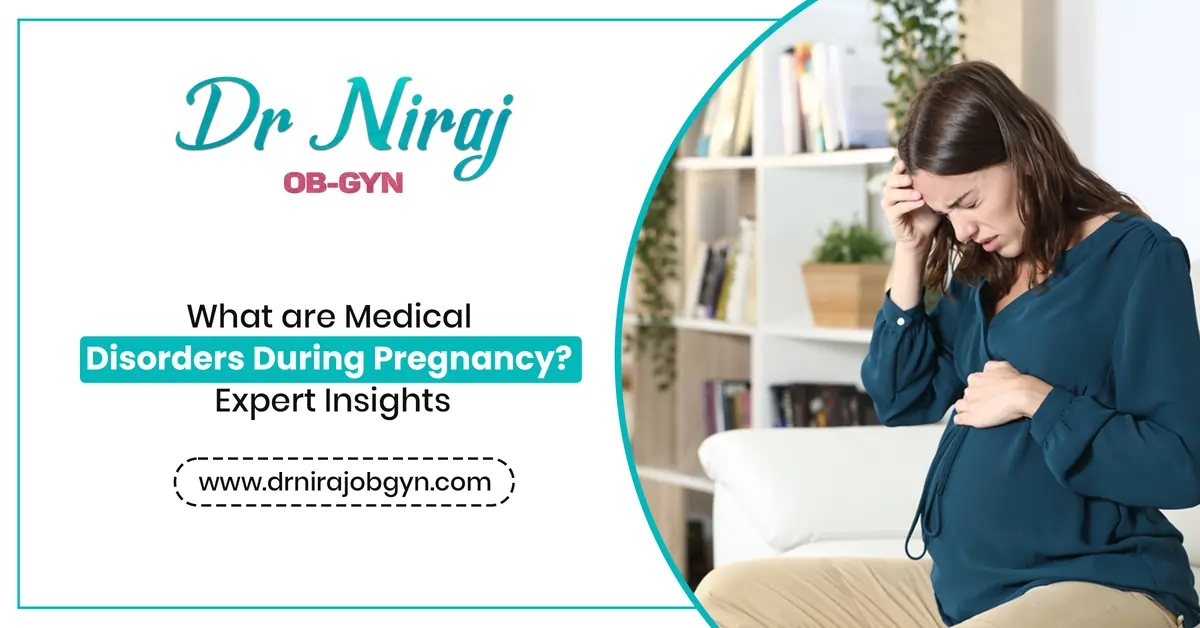
What are Medical Disorders During Pregnancy? Expert Insights
Pregnancy is a happy journey for a woman and comes with numerous body changes. Most of these changes can be normal ones, but some can cause more severe medical problems for a pregnant woman. Hence, early diagnosis and treatment are very important to save the mother and her baby from any potential disease. Knowing what some of the most common medical disorders during pregnancy are can help the maternal population seek the appropriate medical treatment.
Common Medical Disorders During Pregnancy
Certain medical problems occur or worsen during pregnancy as a result of hormonal and other physical changes that accompany pregnancy, as well as increased demands on the body. Among the most common are:
1. Gestational Diabetes Mellitus (GDM)
GDM is a state of high blood sugar that can carry other risks for the developing baby, usually in the second or third trimester. The loss of insulin sensitivity during pregnancy is a transient state, for which most women regain control after pregnancy, but GDM has been shown to affect fetal growth and delivery outcome.
2. Preeclampsia
One of the danger signs of preeclampsia is that it can damage the liver and kidneys in addition to high blood pressure. Most of the time, it develops following the 20th week of pregnancy. You may notice swelling around the face or hands, a sudden rise in weight, painful headaches and problems with your vision. Preeclampsia may become eclampsia (seizures), cause the mother to give birth early or lead to other difficulties if management is ignored. Catching it as early and watching it closely are the main keys to successful treatment.
3. Anemia
Iron deficiency in the body, which can be caused by pregnancy, can cause anemia and tiredness, weakness and breathing problems. Normal iron intake by pregnant women and their babies leads to enough oxygen for their bodies.
4. Thyroid Disorders
Hypothyroidism (thyroid hormone less than normal) and hyperthyroidism (thyroid hormone greater than normal) can both have harmful effects in pregnancy. When untreated, they can lead to pre-term birth, underweight newborns, or a baby with developmental difficulties. Timely screening and correct medical treatment will maintain maternal and fetal health.
Risks and Complications of Untreated Disorders
Ignoring medical illnesses during pregnancy can cause problems like:
- Premature birth
- Infants are considered to have low birth weight.
- Birth defects
- A loss before the baby is born
- Physical damage to a mother’s organs
With timely intervention and routine prenatal care, there is a substantial reduction of these risks. Pregnant women should keep all scheduled appointments and immediately report any unusual symptoms to their doctor.
Recognizing the Symptoms Early
Noticing early warning signs helps people deal with medical disorders more quickly. Some of them might be:
- Experiencing fatigue or dizziness that does not go away
- Swelling in any of the hands, face or feet
- Seeking help if you experience strong headaches or eye-vision problems
- Sudden increase in body weight
- Migration of the fetus
- Bloody or discharge-like fluid coming from the vagina
Upon realizing any of these symptoms, an Obstetrician and Gynecologist in Malaysia should be consulted for additional advice.
Treatments of Medical Disorders During Pregnancy
The treatment plans for medical conditions during pregnancy are carefully tailored based on the type of disease, its severity, and the stage of pregnancy. As a leading Pregnancy and Childbirth Specialist in Malaysia, Dr. Mohammed Niraj Bin Mohammed Feizal ensures that each plan is personalized to safeguard both mother and baby.
Common management strategies include:
- Modifying how you eat and live: By eating differently, increasing your exercise, and taking the necessary supplements, you can help with these conditions.
- Medications: There are situations during pregnancy that require prescribing drugs that won’t affect the mother or child.
- Hospitalization: Severe Precambrian usually requires either close monitoring in the hospital or early labor and delivery.
A specialist will always develop a treatment plan based on the patient’s medical history, condition, and current stage of pregnancy to ensure the best outcomes for both mother and child.
Role of Healthcare Professionals
A multi-disciplinary approach team that includes obstetricians, endocrinologists, dietitians and midwives are crucial in the control of medical disease during pregnancy. Seeing a qualified gynecologist in Malaysia leads to accurate screening, diagnosis, and care along the entire pregnancy journey.
Ensuring a Healthy Pregnancy
Although not all side effects are avoidable, there are some ways to lower the chances:
- Visiting your doctor until the prenatal visits are done
- Consuming a diet that includes iron, calcium, and folate
- Looking after health issues you already have
- Ensuring you get proper rest and deal with your stress
- Trying to stay away from smoking, drinking, and hazardous medicines
In most cases, when pregnancy-related disorders are identified sufficiently early and treated properly, the majority of women deliver healthy babies.
